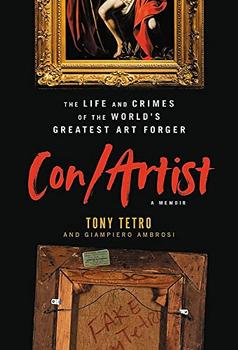Summary | Excerpt | Reviews | Beyond the Book | Readalikes | Genres & Themes | Author Bio

The Life and Crimes of the World's Greatest Art Forger
by Tony Tetro, Giampiero AmbrosiPrologue
(April 18, 1989)
I was lying on the couch falling asleep when I heard a rustling at the front door and someone saying, "Tony? Tony? You there?" I said, "Yeah," and the next thing I knew twenty-five cops burst into my condo. The first thing one of them said was, "A man just gave you eight thousand dollars in cash. I'm going to need that back right now." It was true, so I handed the money over immediately.
The cops began demolishing my place, slicing up the wallpaper, pulling up the carpets, emptying all the drawers. The whole time I sat there on my couch sweating bullets, staring up at my secret room, which was reflected in the mirror on the mantelpiece. The room was in an odd-shaped space behind the upstairs bathroom. If you pressed #* on the cordless phone, a full-length mirror would pop open and reveal my secret stash of special papers, pigments, collector stamps, light tables, vintage typewriters, certificates of authenticity, notebooks with signatures—everything a professional art forger might need.
The cops were rifling through my medicine cabinet, knocking on the walls, checking inside the toilet tank. If they had found my secret room, I would have been buried for real. The whole time, the cops were going back and forth to a big truck, filling it with artwork, boxes, books, anything they could find. Finally, after six or seven hours, the chief detective decided they'd done enough and told everyone to quit.
Everybody stopped what they were doing and walked out. I breathed the biggest sigh of relief in my entire life. But they didn't really leave. They just stood around at the doorstep. There was a long, uncomfortable silence. I was confused. I started to stand up because I thought they were waiting to handcuff me. One of the cops waiting on the doorstep caught my eye, raised his eyebrows, and gave me a shit-eating grin.
Then, the chief detective turned around and shouted, "OK, second walk-through!" and all the cops rushed back in, switching places and calling out, "I got upstairs now, I got the bathroom, I'm over here." My heart dropped out of my ass. I collapsed back on the couch and went completely numb.
If they found my secret room, the life I had been living would be over.
One
"NOW YOU'RE GONNA SLEEP IN IT"
(1950 to 1969)
Fulton, the small town where I grew up, billed itself as "The City with a Future." My father called it the asshole of New York. Today it's just another Rust Belt casualty, but then, it was a thriving all-American town populated by Italian and Irish immigrants who pledged allegiance, went to church, and worked hard at one of the factories—Sealrite, Armstrong Cork, Miller Brewing, or Nestlé, making chocolate, which you could smell from across the river when it was about to rain.
We all dropped our native languages, accents, and foreign names and got on with the business of making it in America. We played baseball, rode our bikes, and swam at Fair Haven Beach on Lake Ontario, where I would spend all day building and decorating elaborate sandcastles. We attended Rotary Club and had charity carnivals for the volunteer fire department. And though we traded insults—us calling the Irish kids "micks," and them calling us "guineas," "goombahs," and "greasers"—it never led to any real animosity. Every Italian guy ended up marrying an Irish girl and every Italian girl married an Irish guy. Even one of my own best friends, Gary Battles, married Rosalie Arcigliano.
My father, James, who everybody called The Gump because of his resemblance to Andy Gump, the 1930s cartoon character, had come over from Bari, Italy, as a child, living first in the Bronx, where he carried ice blocks up the tenement stairs of Arthur Avenue, before moving to central New York. My mother, who had entered Ellis Island from Sicily as Beatrice Di Stefano, came out as Bee De Stevens and married my father at the age of eighteen. They bought a house, had four kids, and got on with getting ahead.
Excerpted from Con/Artist by Tony Tetro and Giampiero Ambrosi. Copyright © 2022 by Tony Tetro and Giampiero Ambrosi. Excerpted by permission of Hachette Books. All rights reserved. No part of this excerpt may be reproduced or reprinted without permission in writing from the publisher.
What really knocks me out is a book that, when you're all done reading, you wish the author that wrote it was a ...
Click Here to find out who said this, as well as discovering other famous literary quotes!
Your guide toexceptional books
BookBrowse seeks out and recommends the best in contemporary fiction and nonfiction—books that not only engage and entertain but also deepen our understanding of ourselves and the world around us.